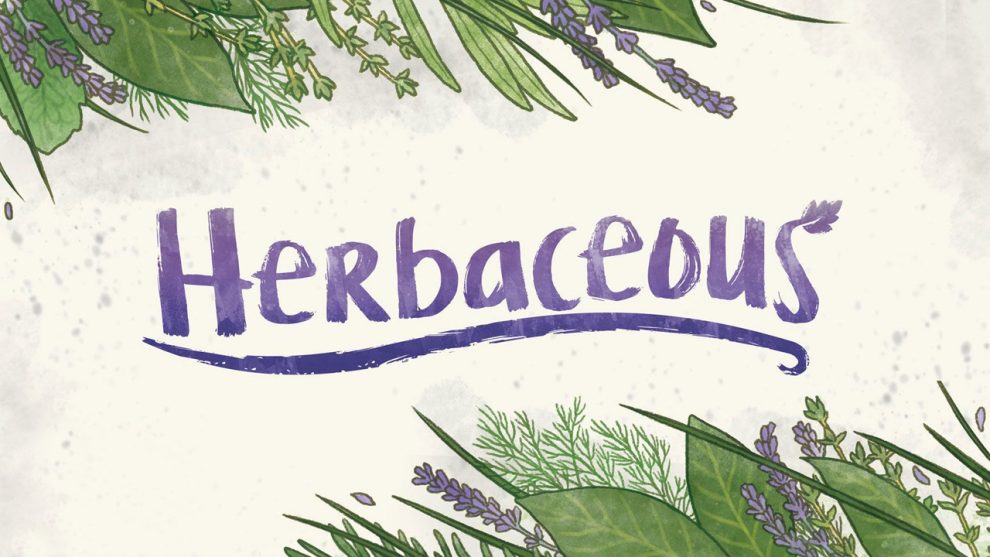Disclosure: Meeple Mountain received a free copy of this product in exchange for an honest, unbiased review. This review is not intended to be an endorsement.
Herbaceous Overview
Growing fresh herbs is a wonderful thing. Having a container within stepping distance from your kitchen means walking outside, snipping or tearing off a few leaves, and adding amazing flavors to your dishes.
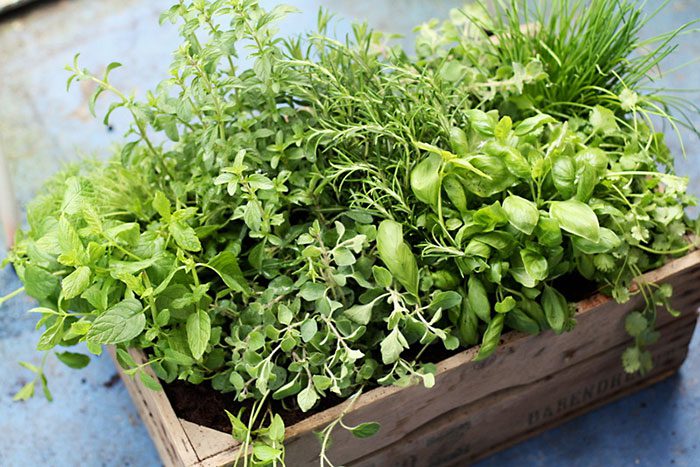
Herbaceous, from Steve Finn, Eduardo Baraf, and Beth Sobel, is a charming set collection card game with a few sprigs of “press your luck”, and a dash of “take that” to keep you on your toes.
How to Set Up Herbaceous
The “mise en place”, or set up, for Herbaceous is simple. Each player receives a set of 4 identical container cards, in their color. The “bun reward” card is pulled out and set aside, and the remaining cards are shuffled and set within reach of all players. Depending on the number of players in the game, a certain number of cards may be removed from the deck before play begins.
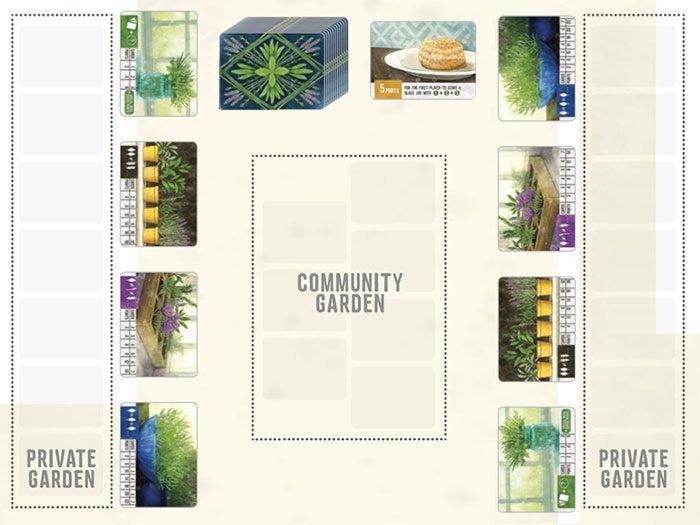
How to Play Herbaceous
In Herbaceous players will be noodling around their garden picking their favorite herbs. They’ll receive points along the way for having just the right collections of herbs and potting them into just the right container. Player can also receive the “bun award” card for completing a collection of the most prized herbs.
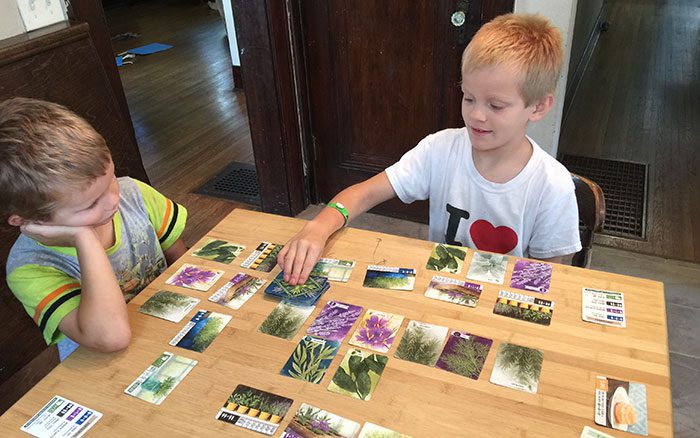
On a player’s turn they have two available actions:
Potting Herbs (optional)
Each of the containers has a different scoring condition. One requires all of the same herb, while another container demands that players only plant different herbs. In either case, players will score points based on the number of herb cards played into a container. Players pick an empty container in front of them; choose herbs from their private garden, the community garden, or both; then lay the cards underneath the chosen container. Containers may only be used one time per game.
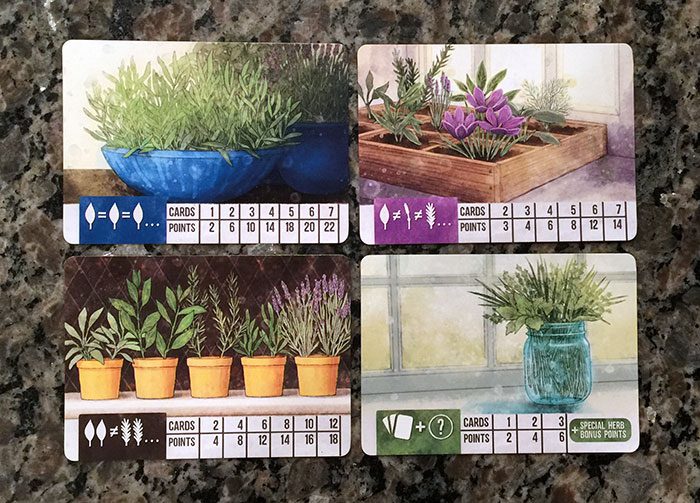
Plant (mandatory)
Players will draw the top card from the deck and view it. They must then decide to put the card into their private garden or the community garden. They will then draw a second card and place it into whichever location was not selected in the first turn.
Players continue in this manner until both players have either used all of their containers, or can no longer fill a container. Players will count up their points, shown in a chart along the bottom of each container. The player who first completely fills their special “glass jar” container will take the “bun reward” card and add it to their score. The player with the most victory points will be the winner.
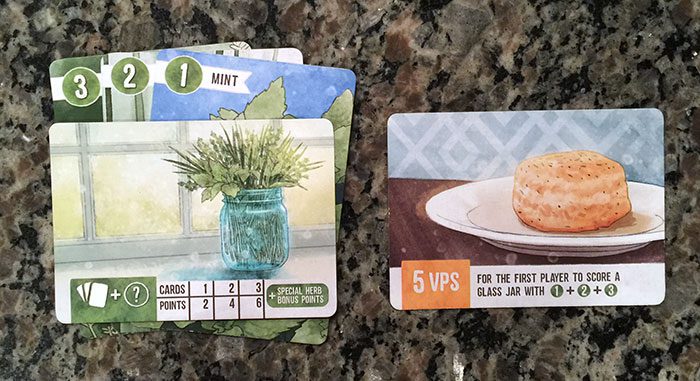
What I Like About Herbaceous
The first thing you’ll notice about Herbaceous is the artwork. It is beautiful. I don’t mean that in a “there there, that’s nice dear” sort of way either.
The full color paintings from artist Beth Sobel simply pop off the cards with both vivid, vibrant colors and soft, muted colors. All of these are in palettes of blues, greens, and browns; and in the case of the saffron card, rich yellows and pinks. You can see some of Beth’s other work showcased in the games Lanterns, and World’s Fair 1893
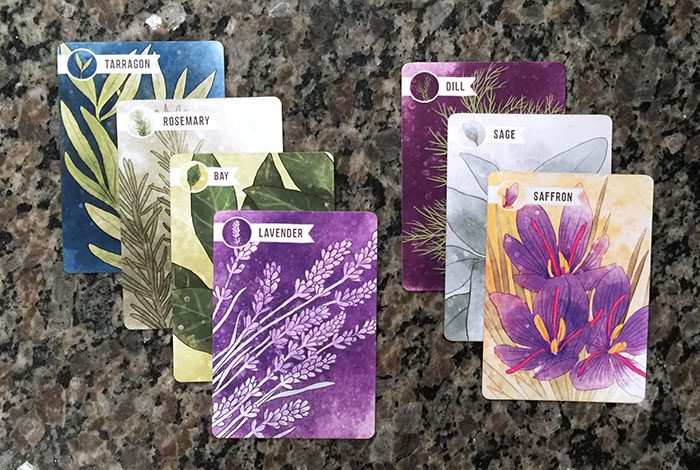
Let’s talk about the game play. This is a light game, let’s make that clear up front. There’s not a ton of choices; since the cards you draw are seen before selecting the next one, you’re working with limited knowledge and you never know quite what you’ll be giving up.
The game is fast; it plays in just 15-20 minutes.
The game is portable; it’s just a single deck of cards.
Yet like adding herbs to a dish, Herbaceous is more than the sum of its parts. It has a press your luck aspect to it…do you grab the cards you’re looking at now, while you can grab 5 of them, or do you take a chance on your opponent picking them before your next turn? It has some portion of take that; instead of using cards from your own garden first, you can always grab from the community garden simply to prevent your opponent from getting them. It has set collection, simple enough to give depth, but not so deep that you’re drowning in it.
What I Dislike About Herbaceous
As I mentioned before. Herbaceous is a light game; in a category commonly called “fast filler”. I really enjoy games in this genre because you can play without having to expend much effort to stay in the game. Still fast filler games have a tendency to fall by the wayside after a few plays and I fear that might happen to Herbaceous.
Final Thoughts on Herbaceous
Herbaceous is a fun game and well worth a look. Both gamers or gardeners will enjoy Herbaceous, but if you’re both then this should be an insta-purchase.
What do you think about Herbaceous? Give us your opinions about what you like and/or dislike about the game in the comments below!


